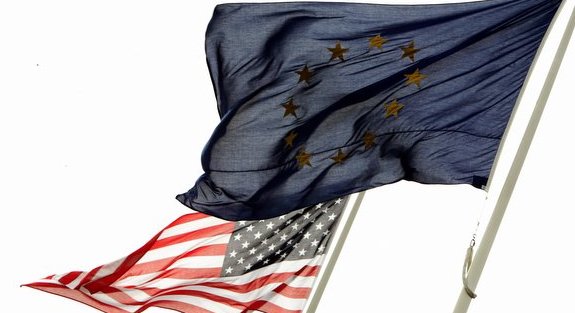No. For a start, in the full flush of anger at European objections to the Iraq war, Kagan got his facts wrong. Europe comprises mid-sized powers, like France and Britain, who in the post-war decades have repeatedly shown their willingness to employ robust means in the pursuit of their interests—most recently, to topple Libya’s Colonel Gaddafi. Germany has recently joined the club, having long practiced military abstinence, for understandable reasons. Though the Federal Republic did not take part in the Libyan campaign—for understandable but wrongheaded reasons—it did help defend the Muslim Kosovars against their Serbian aggressors, even without a UN mandate, and was ready to fight for freedom against Muslim terrorists in Afghanistan—until the United States got tired of lugging that stick around the Hindu Kush. Smaller European nations, too, have done their bit.
Kagan himself seems to have revised his judgment. In a discussion on “the Rise or Fall of the American Empire” in Foreign Policy in February 2012, the erstwhile neocon said, to offset Gideon Rachman’s contention that the West is in decline: “As to Europe, let's take a broader perspective, please. Compared with the devastated Europe that the United States inherited as an ally in 1945, today's Europe, even with its economic crisis, is a mega-superpower and a very fine ally to have, indeed.”
Staying with American thinkers, let’s go back to 1990. This was when John J. Mearsheimer published his influential essay “Back to the Future” in International Security. A quarter of a century later, with the eurozone in the process of following up monetary union with banking and fiscal union, the musings of this self-styled “realist” make for hilarious reading. Without the bipolar division between the nuclear superpowers, Europe, Mearsheimer predicted, would inevitably drift towards multipolar instability, a situation reminiscent of the period between 1870 and 1945, hence the title of his essay. Germany’s drive for hegemony would inevitably lead to war unless nuclear proliferation could be managed intelligently, giving Germany and—yes—Ukraine the bomb in order to create a balance of power in Europe that would guarantee the kind of cold peace the continent had enjoyed after 1945.
Today, west of the line between Estonia in the north and Bulgaria in the south, all the ex-members of the Warsaw Pact are members of the European Union. In the Balkans for a time it seemed as if Mearsheimer’s dystopia—not to mention Huntington’s “Clash of Civilizations”—was becoming reality. Yet now one state after another is queuing up for association and eventual membership. To those raised on the dire predictions of Kagan, Huntington, Mearsheimer, et al., this must seem little short of a miracle. And indeed it is—even if it took the United States, under former president Bill Clinton and NATO jets, to finally end the Balkan bloodshed. What the EU wants to achieve now, as former Enlargement Commissioner Olli Rehn told me a couple of years ago, is to “transform these places into normal, boring European countries” like his native Finland. Boredom is a consummation of history devoutly to be wished.
So, simply for its achievements in making the continent more boring after 1989, the European Union deserves the Nobel Peace Prize. The much-touted unification of the Western half of the continent on the other hand, the end of the bitter German-French rivalry that cost the continent three wars and millions of dead, was—as Mearsheimer rightly pointed out—more a result of the military, political, and economic bipolarity of the continent in the Cold War than of Pan-European idealism. Under the umbrella of NATO—which, by the way, served as a huge “transfer union”, under which America provided soldiers and rockets, and the Western Europeans enjoyed a peace dividend—the one-time rivals pursued their own, egoistic national aims within the European framework.
France, in particular, weakened by the collapse of its colonial ambitions in Indochina, Suez, and Algeria, saw the European project as a way of establishing itself as a continental power vis-à-vis, and in opposition to, the “Anglo-Saxons”. This came to a head in the conflict between John F. Kennedy and Charles de Gaulle. Kennedy’s “Grand Design” for an Atlantic Partnership foresaw Britain joining the “European Economic Community” (EEC), the precursor of today’s EU, which—as the young president said in his speech at the Paulskirche in Frankfurt on June 25, 1963—should aim to become “a world power capable of meeting world problems as a full and equal partner”. NATO was to be the military arm of this partnership, with a unified nuclear command—controlled by the United States. With his “Double-Non” against Britain joining the EEC, and against a unified NATO command, Charles de Gaulle snubbed Kennedy and provoked divisions within Europe that rankle to this day.
Should Europe be a partner of the United States, as Kennedy suggested, or a counterpoint, as de Gaulle envisaged? Should it be part of an imperial bloc of democratic capitalist states, or attempt to be an alternative to “Anglo-Saxon capitalism”? What is more important: “widening” or “deepening”, an “ever closer union” or the “enlargement of the area of justice, freedom or security”? Both aims are enshrined in the treaties and documents on which the EU is based. The Nobel Prize Committee, it seems to me, stressed the Union’s successes in spreading its message of liberty and human rights rather than consolidating its economic gains. And rightly so.
Consider Greece, Portugal or Spain. They may be economically exasperating countries. But considering that until the mid-to-end of the 1970s all three were fascist dictatorships, their progress has been amazing. Europe helped bring down the dictators, and the prospect of joining the European family was instrumental in cementing democratic institutions in all three countries. Were a couple of blind eyes turned? You bet. Would we do it again? You bet. This is the way things went in Eastern Europe after 1989; this is what is happening in the Balkans today. And if a free and fair election in far-away Georgia brings a party to power which wants to lead the country into the EU—an event which barely made the papers in Europe—it should serve as a reminder that, despite the euro crisis and anaemic growth rates, the Union is still the last, best hope for men and women in what the Commission rightly calls “greater Europe”.
Unfortunately, all is not well out there. With Europe’s political class distracted by economic woes, Turkey and the Ukraine have drifted away from the EU. Within the Union, most notably in Hungary, the old ghosts of racism, chauvinism, and anti-Semitism have raised their ugly heads. It is precisely because Europeans come from Mars—and Americans from a Venus where all they had to deal with was a bunch of badly-armed natives—and it is precisely because of our Martian history that Europe cannot afford to descend into hate and prejudice.
Europe is far more than a common currency or a common market. This, too, was what the Nobel Committee stressed. It is the dream of a common house, as Gorbachev said, or of a common city—a shining city on a hill. This city has its roots in an age, in a world, where the Mediterranean was not the border, but the center of the region’s culture: Mare Nostrum. In spite of all the difficulties and petty jealousies that have bedeviled the project, the vision of a “Mediterranean Union” remains exciting—a common city for all nations whose people are fans of FC Barcelona. And they are, from Barcelona itself via Casablanca, Algiers, and Alexandria to Beirut. The Eurovision Song Contest reminds us every year that Europe’s cultural borders extend east to the Caspian Sea and the Caucasus, and south to the gay bars of Tel Aviv and Jaffa. “Böse Menschen haben keine Lieder”, says a German proverb: evil people have no songs. Wrong. But they don’t dress up in camp outfits and sing silly songs. This self-irony is Europe at its best. It sits ill with the pathos of the Nobel Prize and of European declarations; it’s part of the “boring” normalcy people like Olli Rehn, and the much-maligned European bureaucracy, want to bring to as many people as possible. May the Force be with them, and with us.
Alan Posener is a correspondent and commentator for Die Welt and Welt am Sonntag in Berlin and one of Germany's most influential bloggers.









